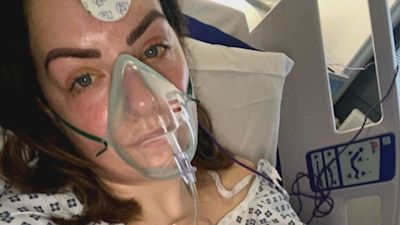'It’s like a chain around your stomach' - Mum describes 'crippling' pain of endometriosis

A woman who has experienced "crippling" pain caused by endometriosis says she is speaking out in an effort to help younger generations understand more about their menstrual health.
It comes as diagnosis and treatment times for the debilitating disease in Wales are worse than anywhere else in the UK.
Anna Cooper from Newbridge, Wrexham has suffered from chronic pain since her periods started aged 11, but she wasn’t diagnosed with endometriosis until she was 18.
Endometriosis is a condition where tissue similar to the lining of the womb starts to grow elsewhere.
But unlike the cells in the womb that leave the body during a period, this blood has no way to escape, causing chronic and sometimes debilitating pain as well as affecting fertility and other parts of the body such as the bowel or bladder.
The condition affects one in 10 women and those assigned female at birth, and at the moment there is no cure for it.
Altogether, Anna, 28, has had 14 surgeries, including a hysterectomy. She lives with a permanent stoma bag after her large colon was removed.
Yet she still has to manage daily pain with drugs like slow-release morphine, as a result of the damage the endometriosis has caused. Anna describes the pain as “crippling”.
'You take pain relief but sometimes even morphine doesn’t touch the sides'
Anna said: “It’s like someone’s got a chain around your stomach and constantly pulling it tighter. And there’s nothing you can do. You take pain relief but sometimes even morphine doesn’t touch the sides”.
Alongside friends she has met through social media who also have the condition, Anna has created the Menstrual Health Project.
Along with BeYou Together Ltd, the project has created an endometriosis diagnostic toolkit that aims to help women navigate their menstrual health.
The kit provides information on endometriosis, what symptoms to look out for and where to access the correct information on the condition.
Anna said “With being dismissed and having to fight to be heard, we wanted to create something where we could create toolkits with the correct information surrounding menstrual health conditions and how to access the care and how to access the help.
“Our hope is to go into schools to be able to support young girls to know what to look out for because I didn’t know what a normal period was because I’d only ever known heavy painful erratic periods from the get-go.
“So for me, that was my normal. But no one should ever suffer in pain, that’s not normal.”
Campaign group The Fair Treatment for the Women of Wales said it currently takes around nine years for a diagnosis in Wales, longer than anywhere else in the UK.
Health Minister Eluned Morgan admits waiting times in Wales are “unacceptable”.
She told ITV Wales: “I’m determined as the first woman health minister for a very long time to make sure more focus is put into women;’s health issues, and endometriosis is one of those.”
The Women’s Health Implementation Group (WHIG), has recently supported the recruitment of specialist endometriosis nurses in each health board to develop new ways of working to reduce diagnostic times across Wales.
WHIG is also working with GPs and primary care teams to improve awareness of the symptoms and support available.
Anna shares a lot of her experiences on social media to help raise awareness and to break down stigmas around menstrual health.
Her biggest driving force is her daughter Grace, who is six years old. She doesn’t want her to have to face the same challenges she faced.
She said: "The scary thought is, now she’s six, she could potentially start her periods in 3 years time and that’s not a long time.
"And I don’t want her to have to face the same stigma that I’ve had to face and so many other women have had to face and I think it really worries me because in the 10 years I’ve been diagnosed, nothing has changed.
"It’s got worse if anything."
“Not everyone with endometriosis ends up with a stoma bag and a catheter, but if it’s left and it’s ignored for so long, the damage is horrendous that the disease causes.
“My purpose is to turn a huge negative in my life into a positive. And that will be my goal, for the rest of my life, is just to raise more awareness about it, because, god forbid if Grace gets it.
"I don’t want her to have to face the same issues we’ve had to face.”
You can hear more about Anna's story on 'Wales This Week: Living in Pain' on ITV Cymru Wales Tuesday 12th April, 8 pm.